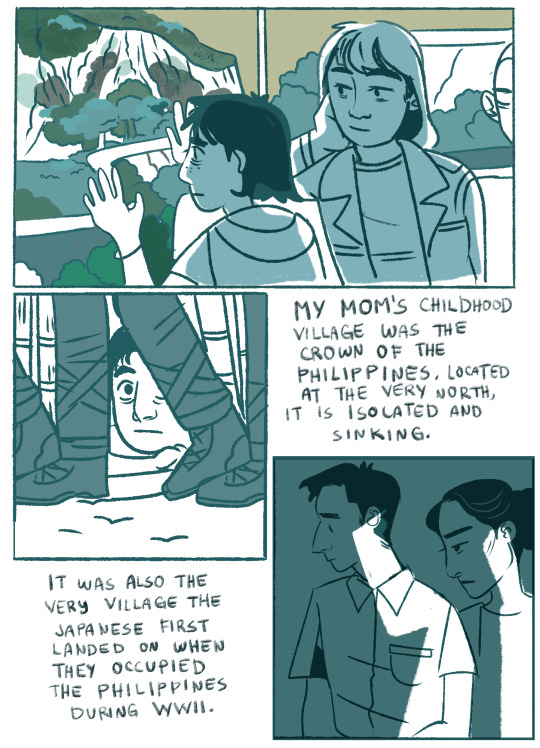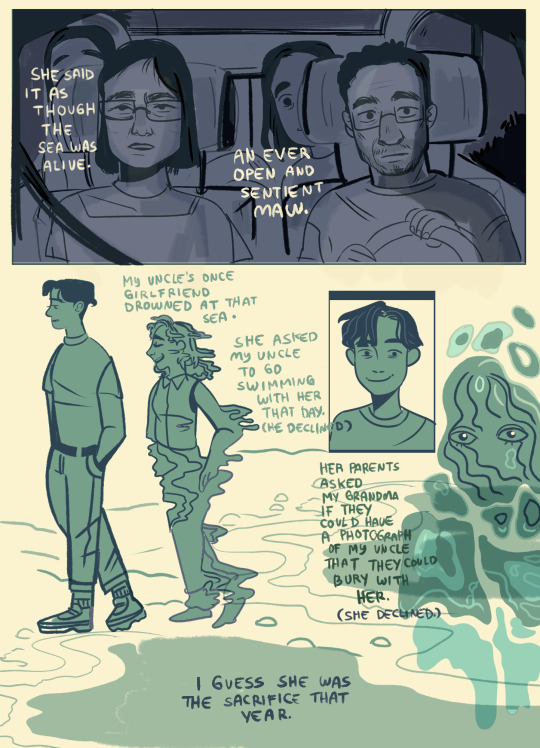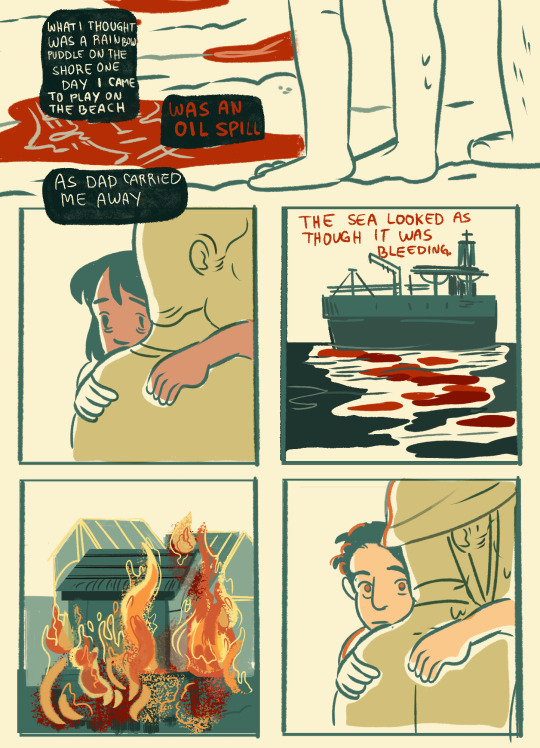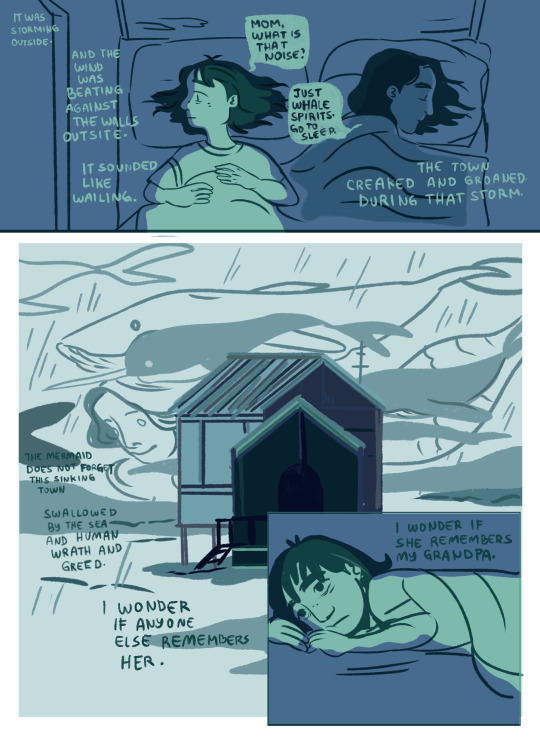Text
everyone should be weirder about their ocs more.
46K notes
·
View notes
Text
After my presentation of the Secret Garden and CEN paper, someone in the audience asked about applying the lens of CEN to other children's book from the same era. I thought about it afterward, and the best example that came to mind was Anne of Green Gables.
Anne Shirley, before her arrival at Green Gables, has experienced CEN. It has played out in a much different way for her than it does for Mary and Colin in TSG, due to differences in social class, but the principle has been the same. As an orphan raised in homes that viewed her as an inconvenience and a sort of unpaid servant, she has never had an adult in her life who prioritized her emotional well-being, who took the time to be kind to her, to listen to her, to teach her how to function in the world beyond basic survival. She is aware that no one wants her after her parents' death, and she is made to feel guilty by her caretakers for having the audacity to exist and need to be "brought up by hand." It's difficult for Anne to even talk about these experiences when Marilla asks her. She's relieved to get relating them over with, because "Evidently she did not like talking about her experiences in a world that had not wanted her."
And then there's this exchange:
“Were those women—Mrs. Thomas and Mrs. Hammond—good to you?” asked Marilla, looking at Anne out of the corner of her eye.
“O-o-o-h,” faltered Anne. Her sensitive little face suddenly flushed scarlet and embarrassment sat on her brow. “Oh, they meant to be—I know they meant to be just as good and kind as possible. And when people mean to be good to you, you don’t mind very much when they’re not quite—always. They had a good deal to worry them, you know. It’s a very trying to have a drunken husband, you see; and it must be very trying to have twins three times in succession, don’t you think? But I feel sure they meant to be good to me.”
Anne has clearly been mistreated, but she's describing--and pointedly not describing--suggests less of aggression and physical harm and more of something missing, an emptiness, a lack of love--CEN. Likewise, she herself exhibits some signs that can be associated with this type of maltreatment. Difficulty with emotional regulation, attachment problems, extreme sensitivity to rejection, negativity toward herself, excessively immersing herself in imagination (a mild dissociative tendency), anxiety around social situations (regarding how to behave correctly and whether people will like her), etc.
And in a way, the entire first book of the series deals with how she finds healing from her past of CEN, through gaining the love and acceptance of her new family, of friends, of an entire community.
From what little I know of L. M. Montgomery's life, CEN was likely a factor in her own upbringing, and it repeatedly features in her novels (The Blue Castle and Jane of Lantern Hill, for instance, in particular feature heroines who have experienced CEN) with poignancy. Montgomery paints moving portraits of how badly children can be scarred by a lack of love and affirmation.
Anyway, situating Anne's backstory as rooted in CEN helped me put my finger on one of the reasons that I felt that the recent series Anne With an E--at least the first season, which is all I've seen--misunderstood the nature of Anne's past. In this version, we see flashbacks to Anne's past, in which she is being viciously bullied by other children for her talkativeness and imagination. They even go so far as to stuff a mouse into her mouth, and the show suggests that Anne has PTSD as a result of this kind of treatment.
And yeah, Anne's childhood in the book isn't great and clearly has hurt her deeply, but this interpretation felt off to me. What Anne has to say--and not say--about her past in the book suggests not that she was targeted as an object of others' aggression but that she was disregarded. No one was giving her a second thought. That's not as dramatic and shocking as vicious bullying, but it's another, more subtle, insidious kind of maltreatment, just as hurtful in its way but harder to pin down. It's easy to portray a quick, sensational scene of our protagonist being obviously, overtly, grandiosely mistreated, but how do you show the gradual piling up of years' and years' of being treated like you don't matter? All the tiny incidents that chip away at one's sense of self-worth? The building of a worldview in which you must earn love and acceptance but somehow you can never manage it and of course it's your own fault?
And I'm reminded how recent adaptations and retellings of TSG shift the narrative toward grief, which is easy to dramatize, big and impressive and full of obvious pathos. It's an easy way out of depicting a subtler kind of suffering, and the same way, Anne With an E replaces Anne's CEN with bullying and PTSD. There is a place for such stories, but Anne's isn't one of them. It's almost as if there's an inability to understand or a reluctance to depict any kind of suffering that isn't big and grand and shocking. There are many ways that people can be deeply hurt, and it doesn't always look like a major traumatic event that's easy to pinpoint. Sometimes the hurt isn't a tidal wave that engulfs in a single devastating event; it's a slow drip that erodes oneself away little by little. That's closer to what is depicted for Anne, and Montgomery's other protagonists who have experienced CEN, and it's important to recognize what exactly is going on because this sort of thing still happens every day in the real world, in many forms, and it needs to be seen and combatted. And seeing this form of maltreatment play out in literature helps us recognize it and empathize with and reach out to those whom it has impacted--or possibly even to identify it in our own histories and search for our own healing.
25 notes
·
View notes
Text
I always stood my ground when it comes to the Alice in Wonderland/Through the Looking-Glass stories. I am certain and I will defend that they are NOT fairytales, despite a mass-culture effort to consider them as such just because they want to lump together all children fiction as farytale (plus Disney's influence of course).
Thinking about it, I recently realized that I can sum up the situation perfectly by creating a triangle with two others works. The Alice books - Pinocchio - and the Oz books.
The Alice books are not fairytales, "modern" fairytales, fairytale fiction or fairytale fantasy in any way. Pinocchio, on the contrary, is what I will call for this post "fairytale fiction", and as such stands as an oposite of the Alice books. (And Oz stands in the middle between the two, I'll come back to this later). [Note: I want to precise that I am a HUGE fan of both the Oz and Alice books. I love them. So I am not saying that negatively, on the contrary, I want justice for them to be recognized as what they are.]
What makes Pinocchio a "modern fairytale", a "fairytale novel", a "fairytale fiction"? (I do not call it "fairytale fantasy" because I keep this term for fantasy works that are primarily fantasy but rely on fairytales for inspiration or motifs, such as the Narnia books, Tolkien's The Hobbit or movies like Legend or the Last Unicorn) One, the book was intended by its author to be a modern fairytale or a new fairytale. Two, the book reuses fairytale structures and archetypes. As simple as that. The Alice books, on the other hand? They were never intended to be "fairytales" and never refered to as such by their author.
Not only that, but these books lack any type of fairytale structure when it comes to the plot or narrative. In terms of structure, half of these books are to be ranged into the "allegory" genre, the "metaphorical journey" - for example Alice Through the Looking-Glass is actually a chess match, a chess game that has been narrativized and word-built to produce a children book. The other half is simply the genre these books hailed, heralded, symbolized: nonsense. The Alice books are one of the most famous displays of Carroll as the master of "nonsense". Because nonsense is a genre in itself, and the first Alice book for example, the Wonderland one, is a nonsense plot. A dream-like journey through a bizarre otherworld solely guiding by the reversal of human norms (everybody is insane, that's the normal), the twisting of what children are taught at school (Carroll playing around with everything children were given to be "equipped" in life and how it would seem absurd to them when confronted with a child-like pragmatism) and the literal application of the kind of philosophical and metaphysical questions children would be faced with. Alice in Wonderland is a "nonsense philosophical" story - in France we have a genre matching the "fairy tale" (conte de fées) which is the "philosophical tale" (conte philosophique), most famously represented by Voltaire's works. Alice in Wonderland is a nonsense philosophical tale, not a fairytale.
Yes, the world Alice encounters is filled with talking animals, magical royalty, and other monsters... But they are not fairytale archetypes or even "types" at all. And that is where things are interesting. Because too many people forget what the worldbuilding of the Alice books is, what the "rules" for creating the worlds Alice visits are.
Yes there are bizarre creatures - but they are creatures born out of puns. The Alice worlds are words of wordplay - Carroll created half of his characters simply by playing on the several meanings of a same word, or by breaking down in a literal way a common name, or even by applying expressions in a pragmatic way. Remember: the Mad Hatter and the March Hare are simply Carroll deciding to use two common sayings about madness as literal characters.
Yes, there are talking animals - but they're not out of fairytales. They are out of NURSERY RHYMES. And there's a big difference. In fact, while I refuse to call the Alice books "fairytale fiction" I do recognize their nature as "nursery rhyme fiction". The Queen of Hearts, Humpty Dumpty and many more were straight up lifted from nursery rhymes, and the entire books rely on the memorizing, parodies and twisting of the nursery rhyme genre.
Finally yes, there is magical royalty, but they are just caricatures of the real-world. The Alice books are meant to mock and caricature the society they were created into - such as how the Red Queen of Through the Looking-Glass is meant to embody strict rules children had to learn and those harsh nannies obsessed with etiquette and how nonsensical the rigid politeness could be. Quite a handful of the characters Alice meets are simply references to real-life people (starting with the Dodo which is Carroll himself, or even Alice herself who is the fictional version of the girl the story was meant for) - and if people did a bit of research they would find that Carroll wrote quite a bit about the intended personality of the characters (he notably described extensively what kind of "person" the White Rabbit was supposed to be).
So... The Alice books are nonsensical philosophy for children, and a comical caricature of society, and a nursery rhyme fiction. But they are not "fairytale fiction" or "fairytale inspired" in any way. Unlike Pinocchio which does deserve its fairytale status, and is an emblem of what fairytale fiction is.
I promised you some Oz so here's my stand... The Oz books started out as a fairytale fiction comparable to Pinocchio. When Baum wrote his first Oz book, "The Wonderful Wizard of Oz", he explicitely intended it to be a modern American fairytale able to rival with European classics. The novel reinvents several fairytale archetypes (such as the witch, the talking animal, the wizard), and applies a certain fairytale structure to its narrative. When Baum wrote a sequel to this book, when book 2 of Oz came out, "The Marvelous Land of Oz", Baum kept it a fairytale fiction. We still had a fairytale structure, a fairytale motif, and fairytale archetypes. This second novel was much more extravagant and bombastic (because it was actually created as a tie-in with the Oz stage extravaganzas Baum had created, hence the "dramatical" and "theatrical" nature of this second book), but it stayed fairytale fiction. And the same can be said of book 3.
However, by the fourth book (Dorothy and the Wizard of Oz) onward, Baum, who was fed up with Oz and only continued because he needed money+ audience pressure, dropped the "fairytale fiction" and rather turned the Oz series into basically something similar to the Alice books. He didn't do full nonsense like Carroll but he did two things that made these books "American Alices". 1) He dropped fairytale-narratives like (go on the quest to kill the witch, go on the quest to obtain your wish, undergo this journey to free the trapped royals) for an absence of real plot similar to the Alice books. Stories start randomly, characters find themselves in a new place for no real reason, they travel through bizarre lands, encounter excentric characters, return home at the end. And that's it. Baum didn't bother with a plot anymore since he knew what kids wanted was just see more of this world and that was it. 2) Over-reliance on punny worldbuilding. This is one of the greatest feature of the "late" Oz books: to create his world, Baum massively uses (if not excusively) puns and wordplays, from which are born entire lands and people - thus making it very similar to the Alice books where the Wonderland and Looking-Glass lands precisely exist to warp language.
As such, this is why I consider the Oz series to stand perfectly between Pinocchio and Alice - it started out as a fairytale fantasy similar to Pinocchio, and then it drifted to a "nonsensical childhood marvel fantasy" a la Carroll's Alice.
57 notes
·
View notes
Text
Some of you asked (in response to this post) what were my favourite stories I'd posted on tumblr were. In no particular order, here are the top 5:
The Blue Key (I think it's the best standalone story I've written, except maybe this Medusa one that I haven't posted anywhere yet. It's pure me and my obsessions on the theme and I'm really proud of the writing itself. I genuinely think it's good. As writers we spend enough time doubting ourselves, so it's really nice to look at something you have done and be like 'huh, yeah, actually!!')
Villain locked up + treated badly (I really like the actual writing craft/descriptions in this one. Again, I think I did a genuinely good job. It makes me feel excited about my writing.)
Super beautiful villain (I can remember my thought process during writing this very clearly. E.g > I'm too ace for love at first sight based on purely physical attraction > so what's going on here? > ooh, ugly/beautiful themes and our stance on morality, plus foil characters, this is tapping into one of the things that fascinate me! I remember someone pointing out 'well, this character could just be ace and kill the villain' and me internally being like 'but I AM ace, do you think that makes you immune to wanting?' Anyway. If I was ever going to pick up a story to expand fully in my own time, it would probably be this one. It just brims with potential to me. Or the ace and the incubi one for a lighter version.)
Tired hero/Villain in cathedral (I often under-utilise setting in my tumblr posts, because they're just not to focus, but I really like how I quietly used the setting in this one. I just love cathedrals)
Princess/Demon Prince or Reincarnated wife of the monster king (oldies, but goldies. If I was ever going to write a me version of a more typical dark romance novel, I reckon it would stem from one of these. I don't know. There's something in the dynamic that I find interesting and dare-I-say mildly original. Worthy of sinking my teeth into.)
400 notes
·
View notes
Text
Are you a swiftie with a lot of opinions? Do you want to participate in a collaborative fan project?
I'm working on a zine celebrating & preserving the current state of swiftieism (more on that here), and I realized that a lot of people were interested in participating, but didn't quite know what to submit. I also have so many personal curiosities about people's relationship to taylor, fandom, and swifties...so I've created this Fan Q&A form with a bunch of open-ended questions for you to answer! Feel free to answer as few or as many as you like, and go as in-depth as you want!
submissions are OPEN until april 19th!
links: website / instagram / tiktok / twitter
47 notes
·
View notes
Text
first day of Zombies! Run
zombies: outrun
sam: the sweetest
me: energized and super hyped!
#i legit was just going to speedwalk#but u try staying calm when someone is telling you to RUN!!! in your headphones#and you hear zombie noises#either way super fun and at least one of the characters already has my whole heart#clary scribbles
2 notes
·
View notes
Text
inspired by boop day, reblog this post if its ok for people to send you random asks and interact on your posts with no judgement. i want to talk to people.
54K notes
·
View notes
Text
There should be a fanfic writing game called the showrunners challenge where someone writes a story and partway through someone else can play things like "actor leaves after 4000 more words" or "topic now too politically sensitive due to unforeseen world events" or "lost rights to that reference"
16K notes
·
View notes
Text
nothing has been more important to my being queer than when i went to my first pride parade, got seperated from my group, had a panic attack about it and was sitting on the side of the road holding a tiny genderfluid flag and freaking out. then this six foot five drag queen in four inch heels appeared from literally nowhere and sat down next to me. i, this scared-shitless trans bi kid at pride for the first time, very nervously told her she looked pretty and i told her my name and that i got lost and didn't feel like i should be at pride and she held my hand and said "oh, honey, everybody deserves to be here, especially you. pride is for everybody who's ever gotten lost, who's been scared of who they are or where they are. you think we never been scared before? pride's for you, honey, because you're scared. you don't have to be proud right now, but you're gonna be one day, honey, i'm sure of it."
i found my group soon after that and i never saw that queen again but to this day i am convinced i met an angel.
so yeah. pride is for you. pride is for all of us.
132K notes
·
View notes
Text
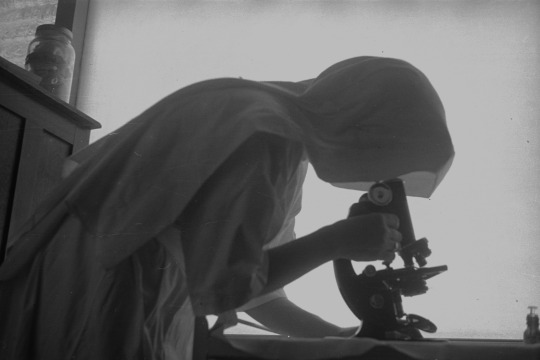
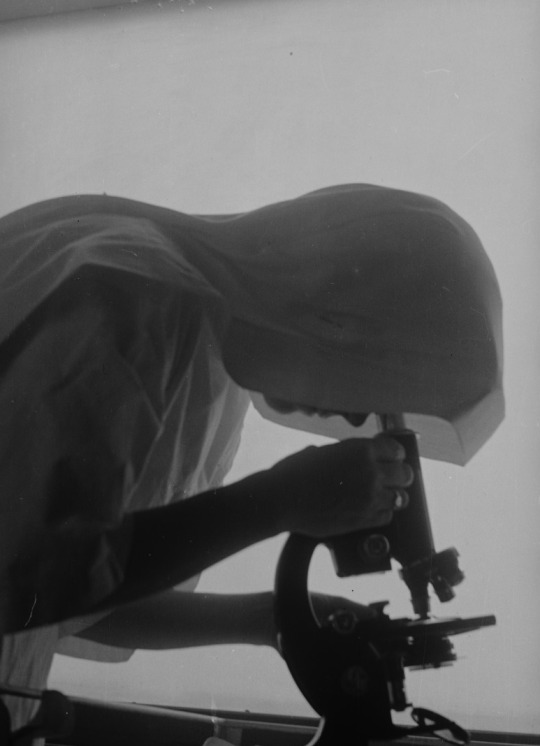
St John of God sister checking blood smear, Derby Leprosarium, 1948
414 notes
·
View notes
Text
@catkin-morgs-kookaburralover
Sure I'll elaborate :)
Zombies, Run! is a a fitness app with a super interesting story element. It has (what I've heard is) a really interesting plot with you as the protagonist--with the setting, of course, you being in a zombie apocalypse. At certain intervals of the story, you'll be alerted that zombies are after you, so you'll have to outrun/outjog them if you want to protect the supplies you're gathering for your base. Apparently it also collaborates with your fav music app, so you can pick what your 'zombies-are-after-you' music is^^
I've been wanting to try this app for years, but I haven't because I didn't have wireless earphones and wired ones are kind of cumbersome for me to exercise with. But now that a friend has gifted me with a pair, I'm very excited to try it out the next few days!
It has been a good long while since I've really deliberately exercised though, so I'm going with it's sister app (Zombies, Run! 5k Training), which is structured like one of those couch-to-marathon exercise plans that gives you more basic training (the original app is more free-form!).
It does cost you money (Google says $5.99), but the first three weeks are free, I think! Considering my biggest problem with exercise is 'it's boring', I thought it might be a solve for me :)
Hey btw, here's a piece of life advice:
If you know what you'd have to do to solve a problem, but you just don't want to do it, your main problem isn't the problem itself. Your problem is figuring out how to get yourself to do the solution.
If your problem is not eating enough vegetables, the problem you should be solving is "how do I make vegetables stop being yucky". If your problem is not getting enough exercise, the problem you should be solving is "how do I make exercise stop sucking ass". You're not supposed to just be doing things that are awful and suck all the time forever, you're supposed to figure out how to make it stop being so awful all the time.
I used to hate wearing sunscreen because it's sticky and slimy and disgusting and it feels bad and it smells bad, so I neglected to wear it even if I needed to. Then I found one that isn't like that, and doesn't smell and feel gross. Problem solved.
There is no correct way to live that's just supposed to suck and feel bad all the time. You're allowed to figure out how to make it not suck so bad.
63K notes
·
View notes
Text
Hey btw, here's a piece of life advice:
If you know what you'd have to do to solve a problem, but you just don't want to do it, your main problem isn't the problem itself. Your problem is figuring out how to get yourself to do the solution.
If your problem is not eating enough vegetables, the problem you should be solving is "how do I make vegetables stop being yucky". If your problem is not getting enough exercise, the problem you should be solving is "how do I make exercise stop sucking ass". You're not supposed to just be doing things that are awful and suck all the time forever, you're supposed to figure out how to make it stop being so awful all the time.
I used to hate wearing sunscreen because it's sticky and slimy and disgusting and it feels bad and it smells bad, so I neglected to wear it even if I needed to. Then I found one that isn't like that, and doesn't smell and feel gross. Problem solved.
There is no correct way to live that's just supposed to suck and feel bad all the time. You're allowed to figure out how to make it not suck so bad.
#This is why I'm gonna attempt to use Zombies Run (Couch to 5k edition!) for exercise#running? ehhh takes a while to get into it#listening to an award-winning audio drama that also instructs you when to run because zombies are after you???#WELL
63K notes
·
View notes
Text
I feel like more people should know about the Filipino phrase bahala na si Batman. quite literally, it means it's up to Batman. on a more figurative level, it means that you're leaving something to God/fate - metaphorically represented by Batman, of course.
big event that you haven't prepared for but you're going anyway? bahala na si Batman. major exams coming up and you haven't reviewed yet? bahala na si Batman. about to do anything remotely risky/luck-based? bahala na si Batman.
anyways, I just think it's hilarious that Batman is now a part of our culture through this saying. is this a thing in other cultures/languages too? let me know!
#what on Earth#I've never heard this#but also kinda checks out hahaha#and bahala na is a common phrase#our more awesome YOLO except we leave it to God#and Batman apparently
6K notes
·
View notes
Text
Reblog to hug the person you reblogged this from and tell them that everything's going to be okay
59K notes
·
View notes
Text
I am a clown who currently only has margarine in her house 🤡😭
0 notes
Text
me: i am but a beginner cook and baker, willing to learn from the experts :)
my cooking class: use margarine
me: excuse you 🤮 don't u know butter reigns supreme, has greater depth of flavor, etc. etc.
1 note
·
View note
